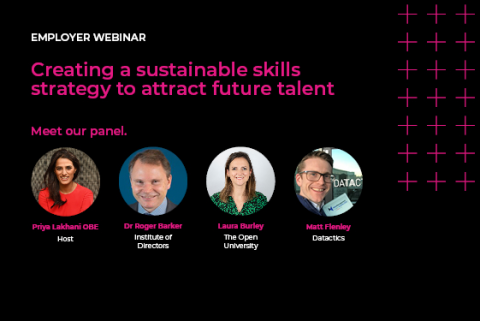You are here
- Home
- Employer webinar on demand: Sustainable strategies for attracting talent
Employer webinar on demand: Sustainable strategies for attracting talent

The Open University's Business Barometer report has been published in partnership with the Institute of Directors (IoD). The report analyses the UK skills landscape, looking at the size, nature and impact of the skills gap across different nations, regions and sectors. The report is based on a survey of 1,500 UK employers across the public, private and third sectors.
A webinar to discuss the report’s findings was hosted by Priya Lakhani OBE, founder of AI company Century Tech. This session looked at the report’s key findings and how they relate to attracting and developing talent in a changing workplace.
The panel included Laura Burley, The Open University’s Apprenticeships Ambassador, Dr Roger Barker, Director of Policy and Governance at the Institute of Directors, and Matt Flenley, Head of Marketing at Belfast-based company Datactics.
Key findings
The report, summarised by Laura, found that the skills gap is being felt across every level and in every sector. The Business Barometer shows that 61% of organisations currently believe they have a skill shortage in their organisation. This is more acute in sectors such as agriculture, forestry, and fishing, pharmaceuticals, and the arts, entertainment and recreation. The report has been tracking these shortages for many years and this skills gap has remained unchanged, indicating a real long-term challenge for employers.
As a business leader of a growing scale-up, that makes me very nervous. At Century, it's certainly been a challenge and that has been a combination of factors, including Brexit and COVID, that we have directly seen within the technology sector.
Priya Lakhani OBE, founder of AI company Century Tech
The report also reveals that the workplace will look very different from now on. “A lot of organisations transitioned to at least some kind of remote working during the pandemic,” said Laura. “Of those who transitioned, nearly a third polled said they transitioned all employees. Interestingly, in the future, 86% of firms that transitioned say they will continue to work remotely in some capacity and one in four plan to give up on a fixed workplace entirely.” Roger agreed that its members are embracing this concept of hybrid working, albeit with a range of conceptions about what this will mean in practice.
“The Business Barometer shows there's some optimism around the potential for remote working to fill skills gaps,” said Laura. Almost two thirds of respondents said that remote working provides an opportunity to recruit people who don't live nearby to fill the skill shortages.
The future of the workplace
Covid-19 catalysed change in many areas of work and fundamentally shifted the way in which people work, interact and consume.
Leadership has had to be really agile as we move on and learn about who wants hybrid and who wants to learn from home. We've had a huge amount of feedback from everybody in the company and unless you involve everybody in understanding how it's benefiting or impacting on their lives, you're going to lose people along the way. And you end up with the risk of people silently switching to another job, which obviously in the IT sector, we particularly can't afford right now.
Matt Flenley, Head of Marketing at Belfast-based company Datactics
The Business Barometer reports that apprenticeships will continue to be perceived as a good way to support sustainable skills strategies with 96% of organisations utilising the programmes planning to maintain or increase numbers.
Organisations need to see learning and development as a key part of the competitive advantage. We’re at a moment right now, where it's difficult to persuade employees back into the workplace and to attract people with the right skills. Learning, development and education are key ways to differentiate yourself from your competitors.
Dr Roger Barker, Director of Policy and Governance at the Institute of Directors
Talent is everywhere, but opportunity is not. We would say to businesses, look where your skills deficits are and map those out. Work with partners to help grow your own talent. This will be really transformative as we look to the future and look to get the economy back on track and help support people's wellbeing and aspirations.
Laura Burley, The Open University’s Apprenticeships Ambassador
Complete the form below to watch the webinar on demand
Fields marked with * are mandatory.
Find out how we can help your organisation
Please contact us to speak to one of our business team advisors.
Not on our mailing list?
Sign up to receive regular emails that are full of advice and resources to support staff development in your organisation.